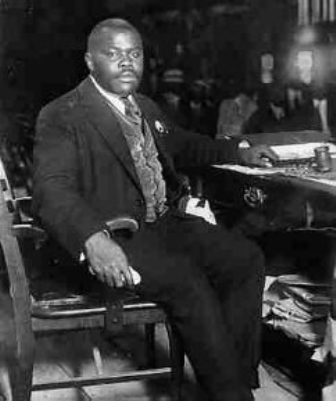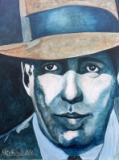The begining - The Revolutionary War
African-American history starts in the 17th century with indentured servitude in the American colonies

The Universal Negro Improvement Association (UNIA) is a black nationalist fraternal organization founded by Marcus Garvey in Jamaica in 1914. Garvey arrived in the United States on March 23rd in 1916 and immediately launched a year-long tour of the country. He organized the first branch of UNIA in June 1917 and began published the Negro World, a journal that promoted his African nationalist ideas. Garvey's organization was extremely popular and by 1919 UNIA had 30 branches and over 2 million members. The organization enjoyed its greatest strength in the 1920s, prior to Garvey's deportation from the United States of America, after which its prestige and influence declined.
According to the preamble of the 1929 constitution as amended, the UNIA is a "social, friendly, humanitarian, charitable, educational, institutional, constructive and expansive society, and is founded by persons desiring to do the utmost to work for the general uplift of the people of African ancestry of the world. And the members pledge themselves to do all in their power to conserve the rights of their noble race and to respect the rights of all mankind, believing always in the Brotherhood of Man and the Fatherhood of God. The motto of the organization is 'One God! One Aim! One Destiny!' Therefore, let justice be done to all mankind, realizing that if the strong oppresses the weak, confusion and discontent will ever mark the path of man but with love, faith and charity towards all the reign of peace and plenty will be heralded into the world and the generations of men shall be called Blessed."
Like the National Association for the Advancement of Colored People (NAACP) Garvey campaigned against lynching, Jim Crow laws, denial of black voting rights and racial discrimination. Where UNIA differed from other civil rights organizations was on how the problem could be solved. Garvey doubted whether whites in the United States would ever agree to African Americans being treated as equals and argued for segregation rather than integration. Garvey suggested that African Americans should go and live in Africa. He wrote that he believed "in the principle of Europe for the Europeans, and Asia for the Asians" and "Africa for the Africans at home and abroad".
Garvey was born in 1887 in St. Anne's Bay, Jamaica. Due to the economic hardship of his family, he left school at age fourteen and learned the printing and newspaper business. He became interested in politics and soon got involved in projects aimed at helping those on the bottom of society. Unsatisfied with his work, he travelled to London in 1912 and stayed in England for two years. During this time he paid close attention to the controversy between Ireland and England concerning Ireland's independence. He was also exposed to the ideas and writings of a group of black colonial writers that came together in London around the African Times and Orient Review. Nationalism in both Ireland and Africa along with ideas such as race conservation undoubtedly had an impact on Garvey.
The Negro World was founded August 17, 1918 as a weekly newspaper to express the ideas of the organization. Garvey contributed a front-page editorial each week in which he developed the organization's position on different issues related to people of African ancestry around the world, in general, and the UNIA, in particular. Eventually claiming a circulation of five hundred thousand, the newspaper was printed in several languages. It contained a page specifically for women readers, documented international events related to people of African ancestry, and was distributed throughout the African dispersion until publication ceased in 1933.
Large branch meetings of the UNIA were like religious revivals, with entire families gathering for a day of debates, fashion shows, classical music, plays and vaudeville acts. Garvey gave his followers, who were dispossessed in the broader society, a sense of belonging. Men could join the African Legion. For young people, the U.N.I.A. Juvenile Division. And in the Black Cross Nurses and the Universal Motor Corps, the Garvey movement offered black women a place of their own. He created the red, black and green flag (shown here) to symbolize black unity. And there were official U.N.I.A. slogans, prayers, poetry and songs.
Garvey was known to rule the U.N.I.A. with an iron hand. He did not tolerate disagreement on even insignificant matters, and demanded complete loyalty from U.N.I.A. members. His autocratic style would over the years cause considerable dissention within the ranks, and turnover and defections among the U.N.I.A.'s top leadership.
In addition to the internal problems of the Garvey movement, Garvey and the U.N.I.A. became targets of the Bureau of Investigation (the precursor to the FBI) in a campaign directed by the then up-and-coming J.Edgar Hoover. For five years beginning in 1919, largely under Hoover's direction, Bureau of Investigation officers would report on U.N.I.A. activities in over two dozen cities. Hoover would also coordinate the actions of at least seven federal government agencies investigating Garvey, in what some experts have called a personal vendetta.
Don't miss a single page. Find everything you need on our complete sitemap directory.
Listen or read the top speeches from African Americans. Read more
Read about the great African Americans who fought in wars. Read more
African Americans invented many of the things we use today. Read more
Thin jazz, think art, think of great actors and find them here. Read more
Follow the history of Black Americans from slave ships to the presidency. Read more
Olympic winners, MVPS of every sport, and people who broke the color barrier. Read more
These men and women risked and sometimes lost their life to fight for the cause. Read more
Meet the people who worked to change the system from the inside. Read more

Visit my RedBubble page and use Michael Arnold Art to create greeting cards, T-shirts, mugs, and more.

The variety and impressive numbers of mammals, birds and marine wildlife in Alaska draw visitors from all over the world. For some travelers, Alaska is wilderness, at least compared to what they may know from back home. The pristine wilderness of Alaska is, perhaps, the last vestige of thriving populations of North American wildlife. Where else can you see polar bears, bald eagles, blue and humpbacked whales, gray wolves, grizzly bears, orcas, lynx, moose, and hundreds of other rare and endangered species in their original and undisturbed natural habitats?

Enjoy our website filled with original signed acrylic paintings by award winning Artist Michael Arnold. Located in Citrus County Florida, Michael Arnold is a the editor at the Citrus County Chronicle. When he's not busy being an editor, he is an avid artist who enjoys painting in a variety of styles. We hope you take the time to click on each image to see a larger view and to learn what the artist, Michael Arnold has to say about his paintings.

As dog owners and people who care deeply for animals and wildlife, we wanted our Dog Encyclopedia to be a website that could empower pet owners to create the most positive, loving environment for their dogs. Dog Encyclopedia realizes that owning a dog is like adding a new member to your family.

Floridian Nature has everything your are looking for in Florida nature. The wildlife of Florida is rich and varied, yet most of us are familiar with only a dozen or so species: the "well known endangered species such as manatees and panthers; those, like raccoons and squirrels, that have adapted to urban environments; the frightening alligators and black bears; and those like the armadillo who can't seem to cross the road. Yet they are just a few of the many animal species found in Florida.
